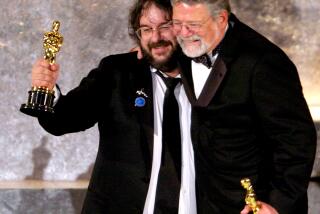2013 a good year for films, a hard one for critics doing their ‘best’
Every December, 50-odd members of the Los Angeles Film Critics Assn. meet and vote on a collective “best” of the movie year. Arguments are made, voices occasionally raised, but mostly there’s a prevailing tedium to the day as members systematically move from category to category, each critic voting for three top choices and, once the points are tallied, the group choosing a winner between two finalists.
This year the best picture vote resulted in a tie, with an equal number of critics raising their hands for Alfonso Cuarón’s visually striking space epic “Gravity” and “Her,” Spike Jonze’s affecting romance between a lonely man and his computer operating system. It was the third draw of the day, an unusual outcome that produced grumbling and, moments later, a passionate denouncement from People magazine critic Alynda Wheat, who called the choices a “grave historical error.” Wheat, standing before the group, argued that “12 Years a Slave” should have won, both for its artistry and the way it addressed the “fundamental shame in our nation’s history” in a manner that resonated with modern times.
This being a room full of professional grumps (full disclosure: I am among their number), Wheat’s disapproval was met with silence and muttering of the who-asked-you? variety. But 30 minutes later, with the vote over, one LAFCA member motioned to bestow a special citation to the creative team of “12 Years a Slave.” The proposal carried, barely, and Steve McQueen’s slavery story, which had finished fourth in the group’s best picture vote, received an official stamp of approval.
We’re at the time of year when critics and awards voters — affiliates of various guilds and Motion Picture Academy members — consider the subjective notion of “best.” Los Angeles critics — often called “contrarian” by outside observers — decided that the superlative could include both “Gravity,” a movie that used technology to create a groundbreaking spectacle, and “Her,” which pondered our relationship with technology within the framework of a sincere romance. Meanwhile on the other coast, the New York Film Critics Circle put “American Hustle,” David O. Russell’s comedy of con artists and capitalism, atop its year-end heap.
As for the multitude of critics groups that followed, it wasn’t even close — 20 of 24 went with “12 Years a Slave.” Three others voted for “Her,” while Toronto critics lauded the Coen brothers’ “Inside Llewyn Davis.” Nobody outside of Los Angeles and New York, widely considered the most prestigious of the critics bodies, honored “Gravity” or “Hustle.”
Was the resounding endorsement of “12 Years a Slave” the result of heeding Wheat’s line of reasoning, that McQueen’s movie was not only excellent filmmaking but also culturally important? And if so, why didn’t Los Angeles and New York see it that way?
“The way to show people that you’re smarter than they are is to make the nonobvious choice,” says Swarthmore College professor Barry Schwartz, author of the book “The Paradox of Choice: Why More Is Less.” “Nonobvious choices communicate to people that you can see things that they miss.”
Maybe. Who’s to say? (Though that could explain James Franco sharing LAFCA’s supporting actor award for “Spring Breakers.”) There may be another factor too, one that relates to the last group to weigh in on the year’s best: Oscar voters.
By the time the Academy Awards are bestowed (March 2, to avoid the Winter Olympics), everyone else has had their say, and there’s usually a consensus as to the movie that academy members should recognize. But sometimes they go in a different direction. Last year the film widely perceived as the most “important” (“Lincoln”) lost to a movie that the academy apparently thought was more entertaining (“Argo”). In 2011 the well-reviewed crowd-pleaser “The King’s Speech” prevailed over “The Social Network,” which had better notices as well as something to say about modern disconnect.
GRAPHIC: Best of 2013 | Entertainment and culture
In a way, those choices as well as others by the academy (“Shakespeare in Love” over “Saving Private Ryan,” “Crash” instead of “Brokeback Mountain,” “Gladiator” and not “Traffic”) widen the definition of “best” by celebrating smart costume confections, rousing historical spectacles and ... (groan) ... “Crash,” a preposterous, manipulative drama about rampant racial prejudice in Los Angeles that many thought spoke truth to our times. Few expected these movies to win the best picture Oscar, and no doubt many academy members took pleasure in going against the grain by voting for them. That’s human nature.
Of course, the reasons behind why Oscar voters, film critics and moviegoers place a movie in high esteem go beyond mere rebellion. Dave Karger, who has long covered the Academy Awards, first for Entertainment Weekly and now as chief correspondent for Fandango, believes all best picture Oscar winners share one element: Voters believed, either because of the filmmaking or the narrative behind the movie or even the narrative behind its awards-season campaign, that they represented the most “exciting” choice.
“When Ben Affleck didn’t receive a director nomination for ‘Argo,’ it became exciting for academy members to check off that box for best picture,” Karger says, adding that for all its virtues, “Lincoln” didn’t thrill many voters.
Still, willful nonconformity probably ranks as the least defensible reason to designate something as best. (Runner-up: Rewarding subject matter over accomplishment.) You’re voting for something. The reasons may be, in a voter’s mind, noble or personal or even partly unknowable. But when you have a good year for movies like 2013, the beauty is that “best” can be defined in a multitude of ways and argued over with a passion that makes moviegoing so rewarding.
More to Read
From the Oscars to the Emmys.
Get the Envelope newsletter for exclusive awards season coverage, behind-the-scenes stories from the Envelope podcast and columnist Glenn Whipp’s must-read analysis.
You may occasionally receive promotional content from the Los Angeles Times.







